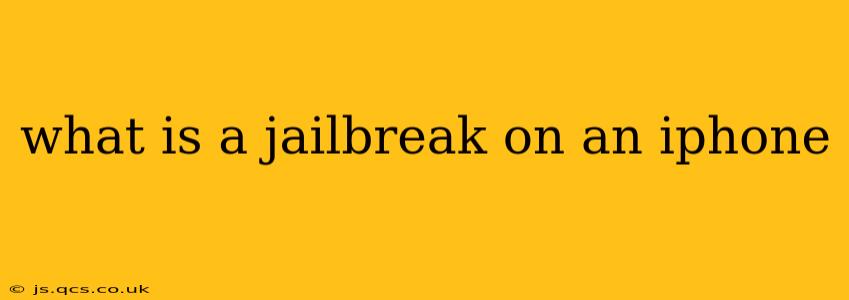An iPhone jailbreak is the process of removing software restrictions imposed by Apple on its iOS operating system. Think of it as unlocking the "factory settings" and gaining root-level access to your device. This allows you to customize and modify nearly every aspect of your iPhone's functionality, far beyond what Apple officially allows. However, it's crucial to understand that jailbreaking carries significant risks and shouldn't be undertaken lightly.
Why Would Someone Jailbreak an iPhone?
The primary motivation for jailbreaking is increased customization and control. Apple's ecosystem is known for its user-friendliness and streamlined experience, but this comes at the cost of limited personalization options. Jailbreaking opens the door to:
- Installing unauthorized apps and tweaks: Access apps not available on the App Store, often offering unique features or functionalities.
- Theming and customization: Completely overhaul the look and feel of your iPhone's interface, from icons and widgets to system fonts and animations.
- Enhanced functionality: Gain access to advanced features and utilities not built into iOS, such as granular control over system processes or improved battery management tools.
What are the Risks of Jailbreaking an iPhone?
While the potential benefits are appealing, jailbreaking significantly increases the risks to your device's security and stability:
- Security vulnerabilities: Removing Apple's security restrictions exposes your iPhone to potential malware and vulnerabilities that could compromise your personal data.
- Voiding your warranty: Jailbreaking almost certainly voids your Apple warranty, meaning you'll be responsible for any repair costs if something goes wrong.
- Software instability: Installing incompatible tweaks or poorly coded apps can lead to system crashes, freezes, and even bricking your device (rendering it unusable).
- Loss of data: A poorly executed jailbreak or the installation of malicious software can result in data loss.
- App Store incompatibility: After jailbreaking, certain apps from the App Store might stop working correctly or refuse to install.
How Does Jailbreaking Work? (A Simplified Explanation)
Jailbreaking exploits vulnerabilities in iOS to gain root access. These vulnerabilities are usually discovered by security researchers and then leveraged by jailbreak developers to create tools that bypass Apple's restrictions. The process typically involves using a computer and specific software to install a jailbreak application on your iPhone.
Is Jailbreaking Legal?
The legality of jailbreaking is a complex issue that varies by jurisdiction. While Apple prohibits it and considers it a violation of their terms of service, the legality often comes down to the intent. Simply jailbreaking your own device for personal use is generally not prosecuted, but distributing jailbreaking tools or using a jailbroken device for malicious purposes could have legal consequences.
What Happens if I Jailbreak My iPhone and Regret It?
Restoring your iPhone to its factory settings will generally undo the jailbreak. However, this will also erase all your data, so backing up your data beforehand is crucial. Consider this before undertaking a jailbreak.
Is Jailbreaking Worth It?
The decision of whether or not to jailbreak your iPhone is entirely personal and depends on your technical expertise, risk tolerance, and desire for customization. The increased risk to your device's security and stability must be carefully weighed against the potential benefits. For most users, the risks outweigh the rewards, especially given the many customization options available through legal means. Proceed with caution and thorough research.
Can I still use Apple Pay after jailbreaking?
No, generally Apple Pay will cease to function after a jailbreak. The security measures implemented to protect your financial information are incompatible with the altered system state of a jailbroken device.
Can I update my iOS after jailbreaking?
Updating your iOS after jailbreaking will almost certainly remove the jailbreak and revert your phone to its original, restricted state. Depending on the jailbreak method used, the update might even permanently brick your device. Therefore, it's generally advised to carefully consider all potential consequences before undertaking a jailbreak, particularly if you intend to keep your iOS updated to receive security patches.
What are some popular jailbreak tools?
This information is omitted to avoid promoting any specific tools or methods that might violate Apple's terms of service or contribute to potential security risks. Research into jailbreak tools should be conducted cautiously and at your own discretion. Remember to proceed with extreme caution and understand the risks involved.
